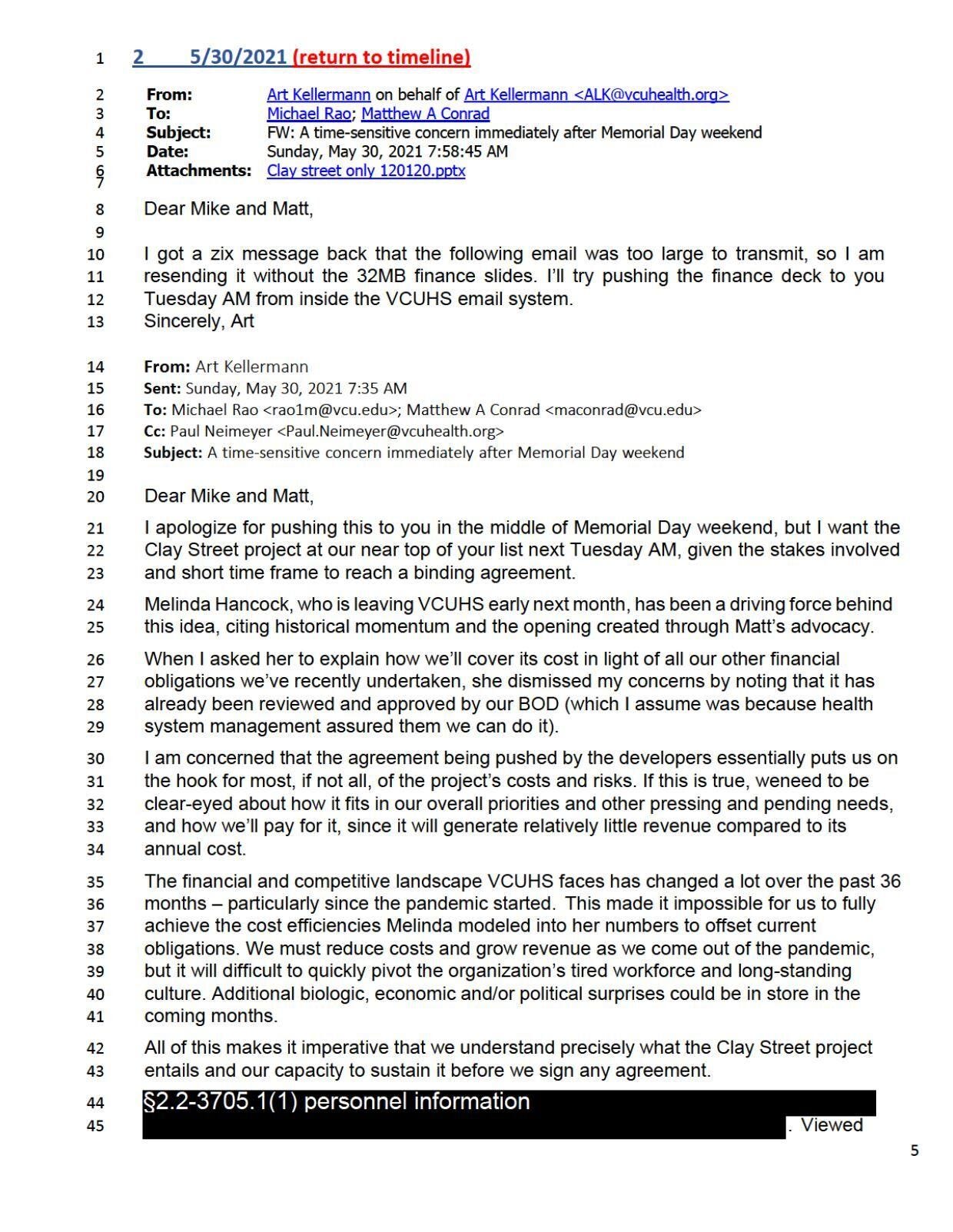 by Jon Baliles
by Jon Baliles
The unravelling saga of a failed development proposal downtown a block from City Hall that was supposed to rise out of the ashes of the failed Navy Hill project is still smoldering. The failed deal has come with a price tag of about $80 million so far (and growing) for VCU Health. They were supposed to be the main tenant of the project and, by all accounts, approved and signed a deal in July 2021 in which VCU accepted heavily one-sided terms that have become so expensive it could still ripple throughout the city, the university, and the state.
Eric Kolenich has peeled back the latest layer of the onion in an eye-popping article in the Times-Dispatch this week, with emails that revealed grave concerns with the deal that would leave VCU Health holding the bag, and also emails that showed more concern to close the deal than what was in it. The emails show both bad communication and miscommunication among those at top levels of VCU’s administration at both the Monroe Park campus and the medical campus. They were sent in a flurry in the weeks leading up to VCU inking and approving the deal, and ignored warnings that were raised in favor of a closer analysis or alternative parachutes that would offer a way out.
After the Navy Hill project failed in early 2020, Capital City Partners, the developers who led that attempt, returned to the city with a proposal for a development for the city’s dilapidated old Public Safety Building at 500 N. 10th Street (aka the Clay Street Project because it is at 10th & Clay Streets). The proposal was for a 17-20 story building that would be leased by VCU Health for office use. They would pay $650 million in rent over 25 years that would produce close to $60 million in tax revenue for the city.
VCU would have to pay rent starting in 2024, whether or not the building was completed, as well as pay for repairs and maintenance. If the project faced cost overruns, VCU would also be on the hook for those. And strangely, since it was office space, it would not generate any revenue for VCU Health like other facilities they had recently built (e.g. the Children’s Hospital).
The deal was put together in early 2020, but Art Kellermann had come on board as CEO of VCU Health by late 2020. According to Kolenich’s review of the emails, in May 2021 “Kellermann strongly disliked the arrangement, saying the costs were high and the risks abundant. Others shared his concern. A vice president for the health system called the project ‘the lease that would go down in history.’”
Another administrator, Melinda Hancock, had negotiated the deal and was about to leave the health system. When she left, VCU Health lacked anyone with intimate knowledge of the agreement.
Kolenich includes one of Kellermann’s email’s (see below) that asks questions you would expect a CEO to ask — things like does this put us on the hook?, how has the landscape changed since the pandemic started?, do we understand the financial implications before we sign the deal? You know, simple questions that most anyone would ask given the price tag, and ones that certainly deserved answers before signing a deal that would commit VCU to hundreds of millions in rent and $80 million in exit fees/penalties.
Kellermann even warned in an email in early June 2021 that “The Clay Street deal is awful. I fear, however, that it is unstoppable — for all the wrong reasons.”
Regardless, Kolenich writes that “…university leaders dismissed his [Kellermann’s] concern, characterizing his emails as annoyances. Ultimately, VCU leaders convinced Kellermann to stick with the deal, which was signed in July 2021.”
Finances aside, other VCU top brass warned about the political waves that might be caused by backing out of the deal. Matthew Conrad, Vice-President of Government Affairs and right-hand to VCU President Michael Rao, sent a strongly worded email to Kellermann that warned:
You are correct that the political stakes are high here. This agreement was blessed unanimously by city council and our board. It is perhaps the biggest economic development accomplishment of this mayor. Walking away would have disastrous effects on other important deals with the city like the development of the 60 acres in conjunction with our athletics facility.
That said, if you truly believe there is lopsided, unmitigated risk that could hinder delivery of VCUHS’ mission, that needs to take priority and should be evaluated and discussed.
Except it wasn’t discussed. In fact, another VCU Vice-President, Karah Gunther, echoed Conrad and said exiting the deal would hurt VCU’s relationship with the mayor, city council and state legislators.
Plus, it’s worth noting that Conrad’s point about the future of the VCU Athletics Village (near the new Diamond District) was a red herring. That complex will be built on parcels of land owned by the state — and thus are immune from city zoning and building requirements and planning decisions (and also tax-exempt).
Kolenich continues:
VCU had pursued the parcel housing the public safety building for 15 years, and city leaders were already celebrating its redevelopment, Conrad said. If the plan failed, VCU would be seen as the “bad guys,” and Mayor Levar Stoney’s team would box out the university from acquiring the land in the future. “I see no second bites at this apple,” Conrad added.
That prediction doesn’t appear to have come true, either, as VCU still hopes to build a $415 million dental school on the plot.
In July 2021, the university’s chief financial officer, Karol Kain Gray, offered her thoughts to Kellermann and others. She repeated points that there were no second chances, that VCU had sought the parcel for more than a decade and that the administration’s position had not changed.
Kellermann accepted her words and signed the deal.
If you have been following the drama in the news, there was very little reported about the Clay Street project except in March 2022, when the developers filed a scaled down version of the project from 17 stories to seven stories. Richmond BizSense reported that it was unknown how the scaled down version would affect total cost or adjusted tax revenues, and the revised plan did not mention VCU Health at all; yet, a VCU spokeswoman was quoted in the article that VCU’s “commitment to be part of the redevelopment project is steadfast.”
Then, in February 2023, the dam broke. BizSense reported that the city had taken the property back because the developer failed to meet target benchmarks. VCU issued a vanilla statement saying they were still committed to making the property “a grand gateway for the state’s primary safety net academic medical center” and that the new School of Dentistry could be built there. They said “the university and health system will uphold our obligations as they relate to prior real estate tax commitments, as well as the demolition of the existing Public Safety Building structure.”
It wasn’t until May 2023 that the details were discovered that VCU had agreed — per terms of the long-since-imploded deal — to pay $73 million (and counting) to officially exit the deal . Which raises the question as to why were the red flags and warning sirens ignored? And why was this VCU Health deal so markedly and disastrously different from all the other major projects that had occurred in the last decade?
This is one of five columns published today by RVA 5×5, a subscriber-focused news, analysis, and commentary site written and run by former Richmond City Councilman Jon Baliles. It is republished with permission. To read more, go to the RVA 5×5 site, which includes subscription information.


Leave a Reply
You must be logged in to post a comment.